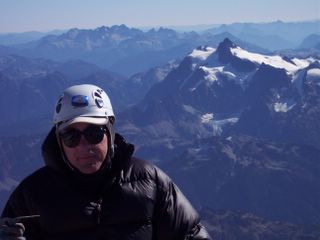In 1686 Bashō included Old Pond in the book Frog Contest (kawazu awase) so you might naturally suspect the poem to conjure images of a frog, jumping, and an old pond - Bashō does not disappoint.
This haiku of Bashō's was indeed a masterpiece. The poem evokes a beautiful serene moment, a simple motion, and a sound which breaks the silence.
| "Old Pond" | Poet: Bashō |
|---|---|
| English | Japanese |
Old pond a frog jumps the sound of water . | Furu ike ya kawazu tobikomu mizu no oto . |
Here is the Haiga painted by Bashō - he also inscribed the calligraphy.
(click on picture)
Such a poem, once it has become famous, can have unpredictable ripple affects!
Ripple Affect: 100 years after Bashō created Old Pond, it remained so famous that many people wanted paintings of Bashō to also include his poem, which would then be added by a professional calligrapher. Some calligraphers however refused to "subjugate" their art by providing such highly commercial services while others begrudgingly accepted the commissions.
So, around the year 1800 Suzuki Nanrei painted just such a picture of Bashō, then asked scholar/ calligrapher Kameda Bōsai to inscribed Old Pond onto it.
Instead of refusing the job, Nanrei tweaked the poem, just a little, then inked it onto the painting. Nanrei obviously had a wry sense of humor; here is what he wrote:
Old pond
after jumpingno frog!
I'm not sure who would hang this one on their wall, but here it is:
(click on picture)
Incidentally, I also like the following translation by Nobuyuki Yuasa:
Breaking the silence
Of an ancient pond
A frog jumped into water—
A deep resonance
References I used for his post primarily were:
1. The narrow road to the Deep North, and other travel sketches
2. Haiga : Takebe Sōchō and the Haiku-painting tradition




Hi Paul-san!
ReplyDeleteYour haiga entry is highly educational for me. ^^; I didn't know there is such a comical? painting and a poem inspired? by Basho's frog poem. ha ha
It should have meant to be humor, but I can feel the beauty of stillness in the place made by a frog jumped into the pond.
Hi,
ReplyDeleteI don't know how I introduce myself here. I've read your comment on Noriko's blog and found out you are from Seattle!!!!Seattle rocks!
I've been there more than decade ago as a student at S.C.C.C. on the Capital hill. I used to live near the colledge. I loved evry single moment there and found seattlites are cool.
Now I'm back in Tokyo longing for the freedom I felt in Seattle. One of my outlet of this nostalgia is 5 line poetry called Gogyohka. Have you heard of that? I post my poems almost daily on a site, Gogyohka Junction. Hope you'd find interesting in the form and join us!!
Poets at the site would appreciate this information of Basho so much....
Chico
Hello chico, nice to meet you.
ReplyDeleteThanks for inviting me to see Gogyohka Junction - I had not known about it and will soon look for your poems there.
I visited the Seattle Asian Art Museum library today (in Volunteer Park) - drove right through Capital Hill and it was such a beautiful day there today.
I miss Tokyo, Yokohama, Kamakura beach, Endoshima (beach), Hakone, Daiyuzan, ...I was only in Japan for 9 months while working, but when I was away from work I jumped on the trains!
Talk to you later...
Your post, like the famous frog, still makes ripples:) Yes, I am one of those who would hang the Nanrei version of the poem on my wall:)
ReplyDeleteAlso, I haven't seen such delightful "ya"; pity you didn't post a bigger picture, so that one can better appreciate the calligraphy.
Thank you for this story, I will store it in a special compartment of my mind:)
Hello Gazzi! Thanks so much for your compliments and I am touched that you found value in my words. After a long absence, I am re-discovering my passion for Haiga. I am now a painter and have begun composing poems to enhance / complete each artwork. Blogspot never notified me of your 2022 comment, so I am only discovering it now, but I will begin updating this blog regularly. Best, Paul
ReplyDelete